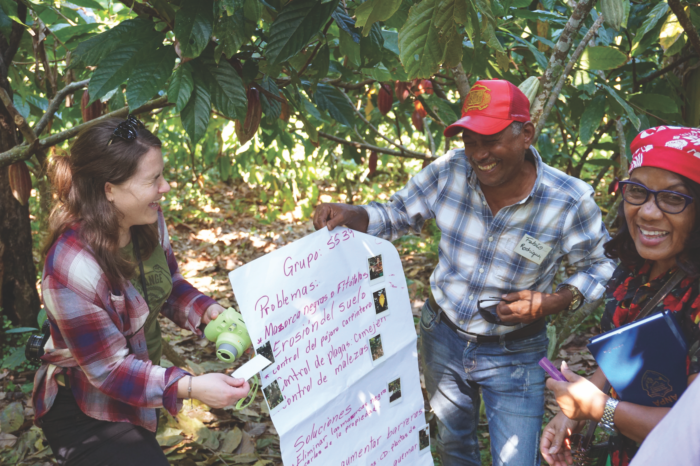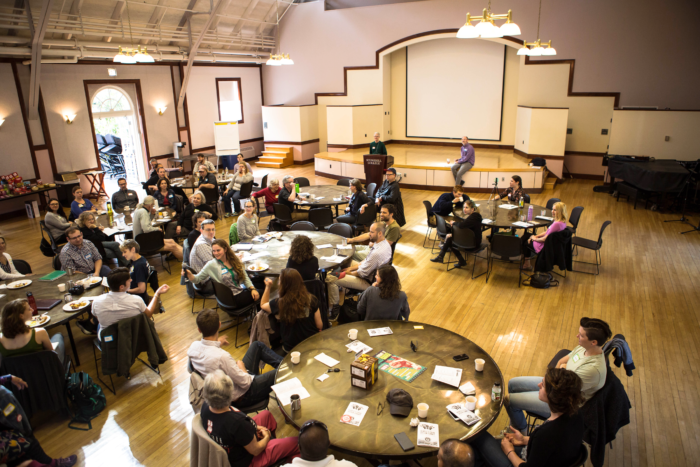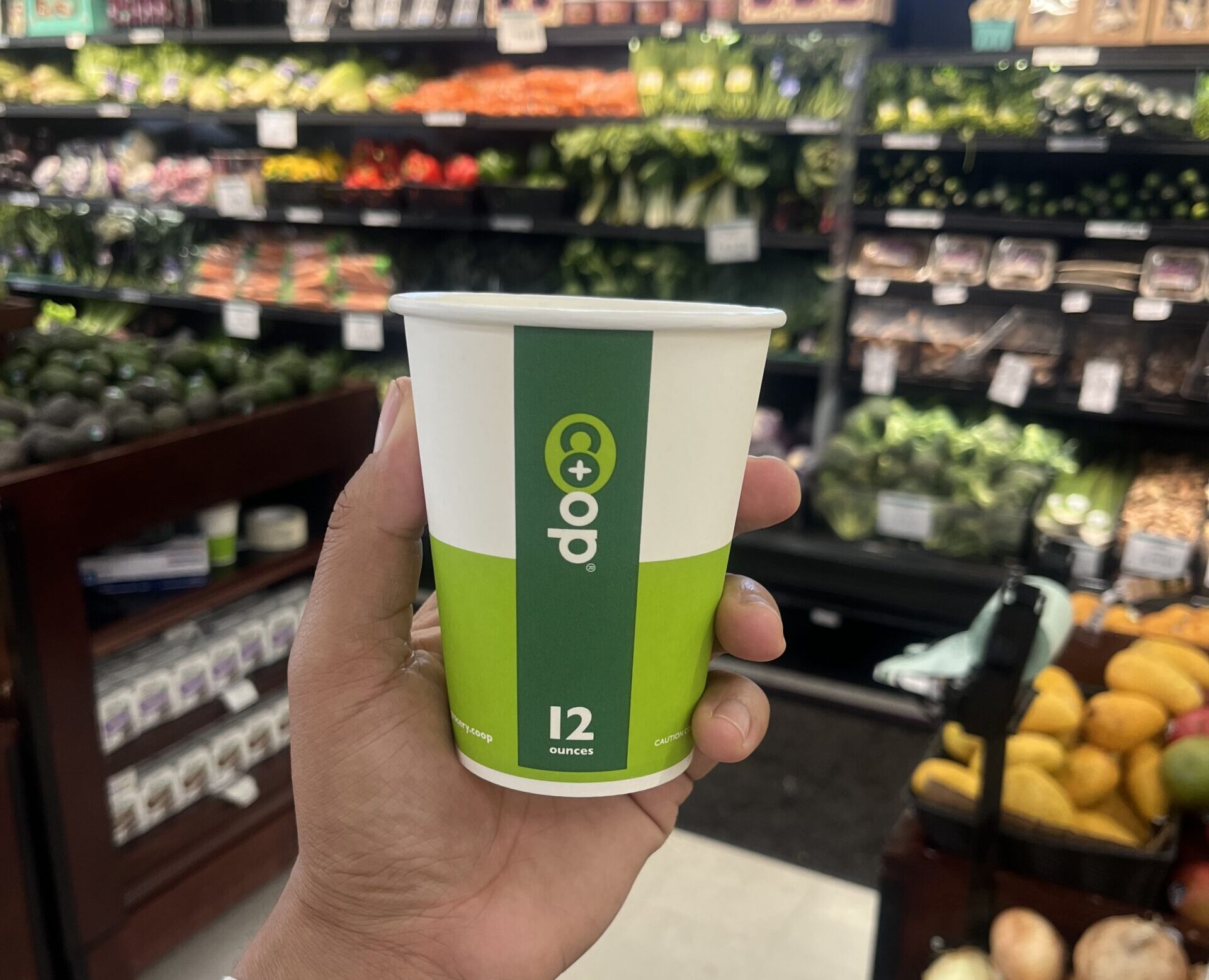
Founded in 1986 by three food co-op employees in New England, each committed to sharing power rather than amassing it—among employees, farmers and consumers—Equal Exchange is now one of the largest worker-owned cooperatives in the U.S.
Headquartered in Bridgewater, Massachusetts, Equal Exchange distributes coffee, tea, bananas, chocolate and other organic, fair trade products sourced from more than 40 farmer co-ops in 20 countries in Africa, Asia and Latin America.
The co-op helped introduce fair trade coffee to U.S. grocery stores in the mid-1980s. And while it continues to sell products to conventional grocery stores and individuals, Equal Exchange has the unique opportunity to operate an entirely cooperative supply chain—where it buys from farmer co-ops, is itself a worker co-op and sells to food co-ops.
To illustrate the uniquely cooperative characteristic of democratic governance and empowerment—part of the ABCs of Co-op Impact framework—we sat down with Lynsey Miller, Director of Sales and a vice president at Equal Exchange with the co-op for 18 years. She reflected on the co-op difference, democratizing food systems, and how the COVID-19 pandemic is spurring conversations about global connectivity and sustainable supply chains.
This conversation has been edited for length and clarity.
NCBA CLUSA: What advantages do Equal Exchange and its employee-owners gain from being a cooperative?
Miller: When I describe co-ops to someone that’s not familiar with it, I often say that they are a group of people who collectively get to decide what we need and how we get it. The primary benefit is that members have a voice, votes and are able to participate actively in some of the core decisions that we make, as well as being able to participate on our board and through various committees. There’s also an economic stake, where [members] purchase a share of the organization. And that’s not just a symbolic thing—it’s really put into practice by a governance structure that gives employees the opportunity to become a part of the whole business.What benefits the employee is also what ends up benefiting the organization as a whole: deeper employee engagement. Our member-owners have a high degree of problem solving and care when it comes to the way we do business. The co-op business model is really a great way to differentiate us from other companies, and even helps us from a marketing standpoint.
NCBA CLUSA: What are some other ways Equal Exchange puts democratic governance and empowerment into practice?
Miller: Democracy is a core component of what we do and there are some really cool opportunities for us to work within a continuous democratic supply chain, where we buy from farmer co-ops, we are a worker co-op and we sell to consumer food co-ops. While we do sell to other outlets and individual consumers, on the purchasing side we are really looking at how to lift up farmers and invest in community empowerment as well. The vast majority of what we buy is from organized farmer co-ops and we know the co-op model creates an infrastructure and network for those farmers. We don’t go in and create that infrastructure ourselves, but we do support those farmer co-ops that have taken these steps themselves. By working at Equal Exchange, I’ve learned that supply chains can be real people and real networks that are organized and act in extremely thoughtful ways. I think Equal Exchange has done a good job of creating cooperative supply chains—in partnership with a lot of other players, we’re sort of adding democracy into the food system.

NCBA CLUSA: What opportunities are you excited about at Equal Exchange?
Miller: We’ve been focusing a lot on having more of an impact, quicker, and for more people. We also realize there’s more of an opportunity to engage the end consumer, so we’ve been really experimenting how to build that engagement. There’s a lot of potential to engage through advocacy and introduce [consumers] to each other and to our farmers and staff. We’ve created an action forum[1]to engage consumers more actively and democratically in our work. Because we are so focused on democracy, we want our consumers to help us define what we should prioritize. It’s been a very rich and fulfilling experience to try and be transparent and open our company to the public and sort of invite them in. A lot of what we do is share power. There’s a model of business all around us where the point of business is to collect power, but we’re kind of doing the opposite, we want to share power more inclusively with more people whether they are farmers, workers or consumers.
NCBA CLUSA: How do you preserve that sense of community and shared ownership over the decades?
Miller: As a co-op that’s been operating since 1986, we have to balance staying true to our original mission and keeping that co-op culture alive and well. We now have around 130 worker-owners and have also grown as a company geographically across the country. Our primary office is in Massachusetts, where we roast our coffee and ship a lot of our products. We also have a West Coast operations center in Portland and over time we’ve added smaller offices and distribution across the country, in addition to individual owners working from home. We’ve realized sometimes we need to slow down to take multiple approaches to a certain problem or proposal. We want to take the time to advance new concepts through our co-op body. The cooperative structure is built for this kind of approach. It’s a platform where people already know each other and have systems of communication and transport in place.
NCBA CLUSA: How has Equal Exchange been affected by COVID-19? How is the co-op responding?
Miller: We’ve been fundamentally impacted—our worker-owners have felt the effects individually and, as an organization, we’ve had to re-evaluate our business because of travel bans and stay-at-home orders. We are trying to apply the most current science to our manufacturing and we’re working to balance the needs of our employees with the need to continue operating. We’ve made many adjustments to our operating teams, from practicing social distancing in the workplace to having smaller teams. We’ve been expanding the work day and adding additional shifts to make up for that. It really feels like each week is a different reality, and we’re trying to stay on track with those changing realities.
This time has also inspired a lot of self-reflection. People are beginning to think differently about how they get their food. They are noticing supply chains and how we’re all globally connected. There are more opportunities focused on food and sustainable supply chains, and I think people will be more receptive to those ideas and interested in engaging with them going forward. There are conversations about compassion and community impact emerging as part of this pandemic that I think are critically important.
[1]New policies at Equal Exchange mean action forum members can be elected to the Board of Directors.


